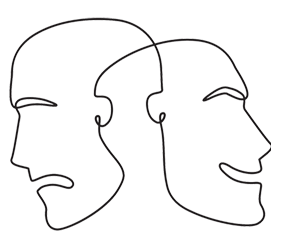Building Community
Emotional Survival Patterns
“Our core belief is that self-care is best nurtured through community. Wherever you are on your journey, you don't have to face it alone.” - YANA.

Connection
Emotional Survival Patterns
1. Difficulty Trusting Others: We struggle with forming and maintaining trusting relationships due to past betrayals or emotional neglect.
2. Perfectionism: We hold ourselves to excessively high standards to compensate for feelings of inadequacy and fear of failure.
3. Overreliance on External Validation: We seek constant reassurance and approval from others to feel valued and accepted.
4. Fear of Conflict: We go to great lengths to avoid disagreements or confrontations, often suppressing our true feelings to maintain peace.
5. Difficulty Setting Boundaries: We have trouble establishing and maintaining healthy personal boundaries, often feeling overwhelmed by others' demands.
6. Emotional Numbness: We may struggle to connect with or express our emotions due to a history of emotional suppression or trauma.
7. Chronic Self-Doubt: We frequently question our own worth and decisions, leading to a lack of self-confidence and reliance on others’ opinions.
8. Tendency to Overextend Ourselves: We take on more responsibilities than we can handle, often neglecting our own needs and well-being.
9. Fear of Abandonment: We have a profound fear of being left alone, leading us to cling to relationships and avoid ending unhealthy connections.
10. Difficulty Accepting Praise: We find it hard to accept compliments or positive feedback, often feeling unworthy or uncomfortable with recognition.
11. Need for Control: We attempt to control situations and people around us as a way to cope with feelings of instability and unpredictability.
12. Avoidance of Intimacy: We struggle with forming close, emotionally intimate relationships due to fears of vulnerability and rejection.
13. Tendency to Overlook Personal Needs: We prioritize others’ needs and problems over our own, often neglecting self-care and personal growth.
14. Emotional Reactivity: We react strongly and impulsively to stress and challenges, rather than responding in a balanced and considered manner.
15. Self-Destructive Behaviors: We use substances, porn, shopping, food, or even cutting as a way to avoid dealing with feelings of inadequacy.
Let's Talk
You will receive a 15 minute phone call from our group leader, as an introduction to the program and to discuss suitability. This is free and without obligation.
Our Guide to Healing.
In our groups, we initiate members into the art and practice of compassion, placing significant emphasis on fundamental principles like deep listening, self-reflection, and the application of reflective therapy techniques. The bedrock of YANA's philosophy is a steadfast dedication to compassion. We uphold the belief that every member should encounter a secure and nurturing environment where they can openly and authentically express their thoughts, emotions, and experiences.
At YANA, we wholeheartedly embrace deep listening as a core practice within our groups. This practice yields a multitude of benefits, including heightened mindfulness, reduced stress levels, enhanced concentration, and a profound connection with the present moment. Ultimately, deep listening fosters greater empathy and understanding in our interactions with others, contributing to our commitment to compassionate and meaningful connections.
The YANA Self-Reflection Technique is a method that prioritizes attaining a serene state of mind before engaging in introspection. It centers around uncovering the "What" and "Why" of self-reflection, gradually delving deeper into one's emotions and thoughts. By conscientiously observing one's thoughts and actions in everyday life, the YANA program utilizes self-reflection as a means for personal growth and transformation, always emphasizing the importance of self-compassion and fostering a compassionate learning approach. Ultimately, self-reflection is depicted as a sacred and harmonious solo dance, leading to heightened self-awareness and a more balanced life.
Identification with personal experiences, feelings, and thoughts serves as a cornerstone of our reflective practice. When sharing, we encourage you to draw from your own unique journey and perspective, allowing for a more profound and authentic exchange of insights and reflections within our community. The group's format is marked by its strong commitment to creating a structured and safe environment that fosters open self-expression, encourages reflective listening, delves into emotions and experiences, facilitates constructive feedback, and embraces the rich tapestry of diverse perspectives. The outcomes frequently extend well beyond the confines of the group sessions, leading to enduring personal and professional growth, thus endowing these gatherings with a cherished role as a valuable resource for gaining profound insights into one's behavior, emotions, and relationships.
Through identification, we can reflect on our own personal experience, feelings, and thoughts. So, when you share, please share from your own personal experience.
While attending the meeting, we ask that you dress appropriately. Do not be like the network news reporter who got caught on air wearing shorts under his suit top. Wear pants, even if you think nobody will see them.









